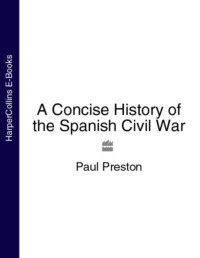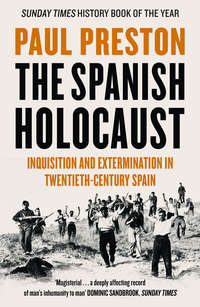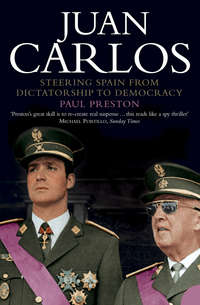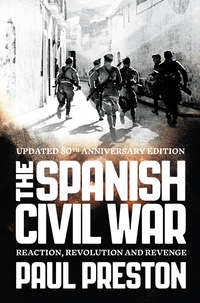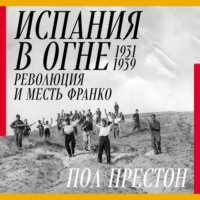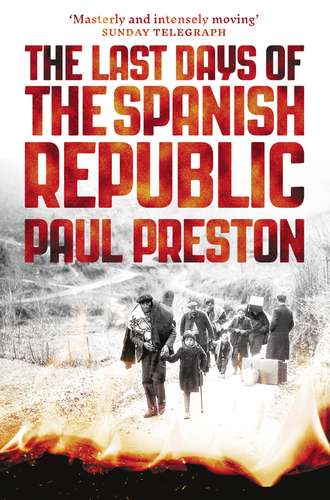
Полная версия
The Last Days of the Spanish Republic
Only men blinded by vanity and arrogance could fail to see that everyone was against them when they returned to the centre-south zone; everyone except the gang of Communists who continued to manipulate Negrín, driving a wedge between him and the Socialists and forcing him to oppose the will of the rest of the Spaniards … Negrín’s government was a phantom. Not one Ministry worked; none of the Ministers had the slightest desire to establish themselves; their one obsession was to secure for themselves a way of getting out of Spain … The government had no will to lead and, what is worse, no one thought that they had to obey it.14
Unlike Trifón Gómez, the Communist Jesús Hernández believed that resistance was possible, yet he described Negrín’s government in similar terms as ‘a kind of mute paralytic phantom that neither governed nor spoke and that lacked both an apparatus of state and a fixed seat of government’.15
On 8 February, while still in France, Negrín had made three appointments that he would soon regret. The unreliable General José Miaja was promoted from commander of the group of armies of the Centre to supreme commander of the Republican army, navy and air force, which was really only a promotion in name. The pro-Francoist General Manuel Matallana Gómez was promoted from chief of the general staff of the armies of the Centre to commander thereof. Matallana’s previous post went to the equally pro-Francoist Colonel Félix Muedra Miñón. Already, there were rumours, which Miaja hastened to deny, that his general staff was in contact with Franco’s headquarters. He called it ‘an absurd fabrication’ (una patraña absurda) but it was in fact the case.16
These postings were, in part, Negrín’s considered response to a series of suggestions made to him on 2 February, almost certainly by Colonel Cordón. The doubt arises because the document containing the recommendations is unsigned. However, the overall drift suggests the thinking of the Communists and, therefore, in the context of Figueras on 2 February, of Cordón. The first suggestion, which was acted on, was the most intriguing. It was that, given the accumulation of tasks falling to Miaja since the declaration of martial law, operational responsibility for the Army Group of the Centre should be passed to General Matallana. If, as the other recommendations imply, the document’s author was Cordón, it would show that, at this stage, neither the Communists nor Negrín had any substantial suspicion of Matallana’s loyalty.
The next two proposals, however, point to a degree of suspicion and therefore to Cordón’s authorship of the document. They called for the Communist ex-minister Jesús Hernández to be left as commissar to Miaja and that another Communist hard-liner, Luis Cabo Giorla, be appointed as commissar to Matallana. The next suggestion was that Casado be relieved of command of the Army of the Centre and be appointed Director of the Higher War College, where he had been a professor before the war. The idea was that Casado would be replaced by Colonel Juan Modesto. Equally interesting were the following recommendations which called for José Cazorla, the coldly efficient Civil Governor of Guadalajara, to be made overall chief of the Republican security service, the Servicio de Investigación Militar (SIM), in the centre-south zone and for Ángel Pedrero to be replaced as head of the SIM in Madrid by a Republican, Juan Hervás Soler. Apart from a series of proposals for improving the efficiency of the Army of Catalonia, the most significant of the other suggestions was that the highly talented Communist Civil Governor of Cuenca, Jesús Monzón Reparaz, be made Director General de Seguridad.17
Dolores Ibárruri recalled in her memoirs that the PCE leadership had informed Negrín of its belief that Miaja and Casado should be replaced. This reinforces the likelihood of the document having been drawn up by Cordón. She claimed that Negrín had refused to dismiss either man ‘lest it provoke acts of indiscpline that could undermine resistance’.18 Had Casado been replaced by Modesto and Pedrero by Hervás, the planned coup would probably have been dismantled before it could be implemented. Of course, the Francoist high command had other sympathizers to whom it could turn – above all Matallana, but also numerous key elements in the general staff, notably Colonel José López Otero, the head of Casado’s general staff. Nonetheless, the SIPM had focused its plans on Casado. There remained the existence of the anarchists’ fierce opposition to Negrín and the Communists. The IV Army Corps led by Cipriano Mera was to be an essential element of Casado’s project. However, it might be speculated that without Casado and with Cazorla, Monzón and Hervás in control of the security services, anarchist subversion might have been forestalled. Shortly after his return to Spain, on 11 February, Negrín had ordered that Pedrero be dimissed. When Santiago Garcés, the overall head of the SIM, asked him to resign, Pedrero replied that he could do so only if ordered by the Minister of the Interior. He added that, if he was sacked, Casado would resign as commander of the Army of the Centre. When Negrín met Casado the next day, he confirmed that he would indeed resign if Pedrero was removed.19 In the event, the only elements of the suggested reorganization of military and security forces that were implemented were those relating to Miaja and Matallana.
Конец ознакомительного фрагмента.
Текст предоставлен ООО «ЛитРес».
Прочитайте эту книгу целиком, купив полную легальную версию на ЛитРес.
Безопасно оплатить книгу можно банковской картой Visa, MasterCard, Maestro, со счета мобильного телефона, с платежного терминала, в салоне МТС или Связной, через PayPal, WebMoney, Яндекс.Деньги, QIWI Кошелек, бонусными картами или другим удобным Вам способом.


